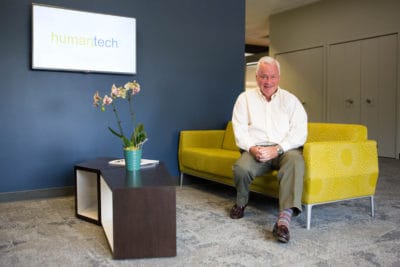
Humantech, Inc. Ann Arbor, Michigan
In 2010, Humantech introduced a four-stage business transformation strategy. The strategy’s final stage was to completely overhaul and refit the corporate office, using LEED standards on all materials and equipment. Lighting was converted to LED bulbs, air handling units were recommissioned, and water heaters and servers used in the building were drastically reduced. The company now uses the EPA ENERGY STAR Portfolio Manager to track its energy consumption and greenhouse gas emissions.

WINNER – Marquette Food Co-operate Marquette, Michigan
The Marquette Food Co-op recently renovated an abandoned grocery building to be the new home of the fast-growing business. By incorporating energy-efficient practices into the renovation, the co-op tripled its square footage while still reducing energy costs. All office equipment is now ENERGY STAR, and the building uses low-flow faucets gallons per flush toilets, and LED lighting. In addition, reclaimed heat from the compressor room is used to heat water and supplement the boiler.
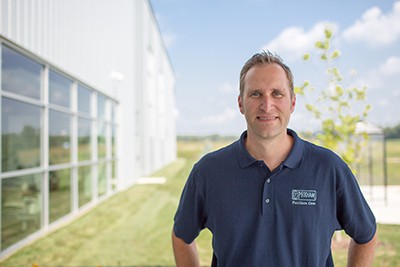
Peckham, Inc. Lansing, Michigan
Over the past ten years, Peckham, Inc. has added a number of LEED-certified facilities to support its vocational training, assessment, and rehabilitation programs. The facility nominated is Peckham’s second Gold LEED warehouse, which was designed to be 52 percent more energy efficient than required by code. The warehouse incorporates LED interior and exterior lighting, high-efficiency air rotation units, and thermally enhanced walls.
BEST PROJECTS – PUBLIC
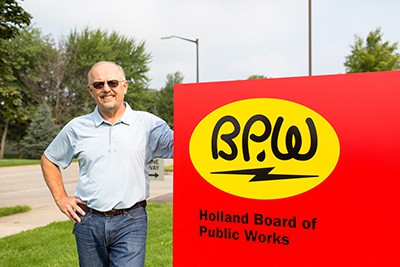
Holland Board of Public Works Holland, Michigan
In 2006, the Holland Board of Public Works (Holland BPW) service center’s energy score was 30. It used 1.2 million kilowatts and 30,000 cubic feet of natural gas per year. Since then, Holland BPW has chipped away at this problem until its energy score reached 87 in May 2015. The organization converted its electric boiler to natural gas, changed most of the lights to LED bulbs, insulated the roof deck, used energy storage in the form of an “ice bank,” and added occupancy sensors and setback temperature settings.
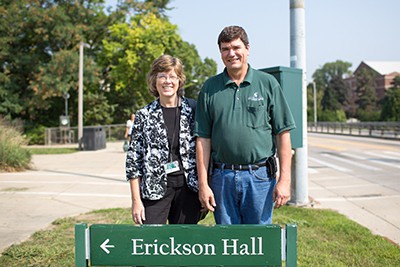
Michigan State University East Lansing, Michigan
Michigan State Univeristy (MSU) participates in the Better Buildings Challenge, which calls on participants to be at least 20 percent more energy efficient by 2020. Already, Erickson Hall has reduced its annual energy consumption by approximately 41 percent. MSU used a building-profiling system to determine which of its 110 buildings has the best opportunity for energy savings. MSU’s Erickson Hall was the pilot project and ended up with 31 percent energy savings and a savings of $150,000 in annual costs. This was accomplished by implementing several energy saving measures including sealing openings in the building, converting constant volume air handling systems to electronically controlled systems, and installing a steam trap testing and replacement program.
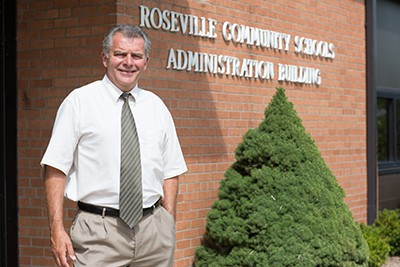
WINNER – Roseville Community Schools Roseville, Michigan
Roseville Community Schools took advantage of the DTE Energy Efficiency Program for Business in order to offset costs of summer upgrades. The program supported the district with over $150,000 in incentives; in total, the school invested more than $1 million in energy-efficiency projects. Roseville Community Schools made upgrades to its refrigerator motors, HVAC controls and variable frequency drive fans, exterior and interior lighting, and computer network management controls—reducing the district’s electric usage by nearly one million kWh each year.
BEST PROJECTS – RESIDENTIAL
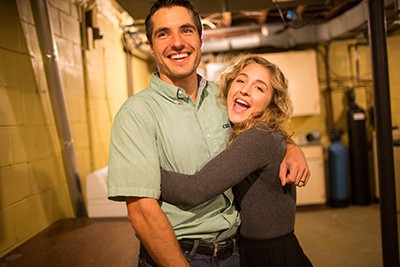
WINNER – Mike and Jackie Miller Fenton, Michigan
In February 2015, the Millers received a home energy audit from Ecotelligent Homes on their early 1900s farmhouse. The audit found a number of concerns in the house, including a fuel oil furnace that posed a health and safety risk. Through Ecotelligent Homes and Michigan Saves financing, the Millers replaced their dangerous furnace with an ENERGY STAR-rated geothermal heat pump. They also completed improvements to their lighting, air sealing, and insulation.
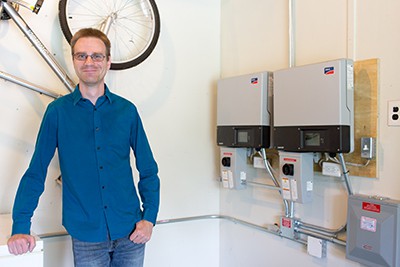
Timothy Morningstar Saginaw, Michigan
When Timothy Morningstar bought his home in February 2014, he got right to work making energy-efficient upgrades with the help of Salvatore Contracting and Michigan Saves financing. To date, Morningstar has already invested nearly $40,000 into the house, including a high-efficiency furnace and 8.6 kWh solar array. Morningstar is now more comfortable in winter and uses the solar array to charge his Chevrolet Volt. He conserves energy however he can, whether it’s charging his car during off-peak hours or limiting his pool pump usage to five or six hours a day.
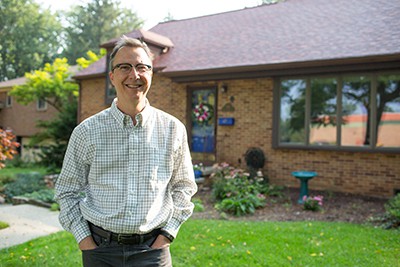
Charlie Richardson East Lansing, Michigan
An energy-efficiency consultant for more than 25 years, Charlie Richardson noticed there was room for improvement on his recently purchased home. The roof had troublesome ice dams, bedrooms were too cold in the winter and too hot in the summer, the unheated garage had exposed ducts, and the fireplace was inefficient. Richardson made upgrades to his water heater, gas fireplace, air-conditioning, lighting, and insulation. The electricity use in Richardson’s home is expected to drop 40 percent due to the improvements installed by Comfort First Heating and Cooling.
BEST PROJECTS – INDUSTRIAL/MANUFACTURING
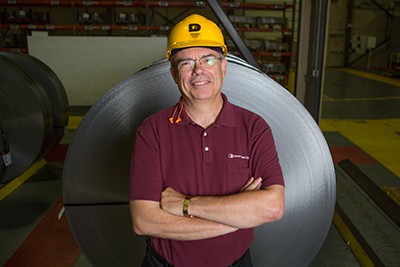
Dennen Steel Corp. Grand Rapids, Michigan
Dennen Steel Corp. installed new energy-efficient infrared heaters and 92 percent-efficient air handling/makeup units. These installations created a more efficient HVAC system, which now saves the company 52,000 cubic feet of natural gas and $47,000 annually. Additionally, the new HVAC system runs through ThermoDAS, a Web-based management system that makes it possible to track building performance. By replacing larger horsepower motors on air equipment, Dennen Steel Corp. now saves approximately $16,000 a year. Additionally, the company has received $37,000 in incentives for these recent projects.
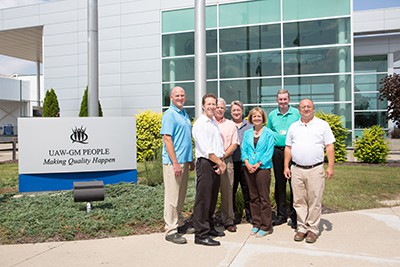
General Motors Lansing, Michigan
General Motors (GM) made energy-efficient upgrades to its two Lansing facilities through the Lansing Board of Water and Light’s Hometown Energy Savers program. The GM Lansing Grand River plant received lighting upgrades, occupancy sensors, electric forklift charging stations, and more. The GM Lansing Delta Township plant received lighting upgrades and occupancy sensors as well, in addition to an air compressor conversion project. Combined, these projects lower GM’s plant operating costs.
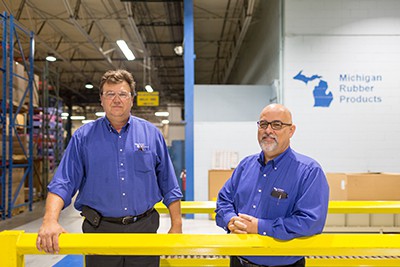
WINNER – Michigan Rubber Products Cadillac, Michigan
Through an energy audit, Michigan Rubber identified many areas for energy improvements—including a cooling system that was leaking and in need of repair. A 125-ton chiller was removed by improving a piping system. Additional upgrades included LED lighting, and a Web-based control system. The upgrades ended up creating a positive cash flow of $68,000 a year.
BEST PROJECTS – AGRICULTURE
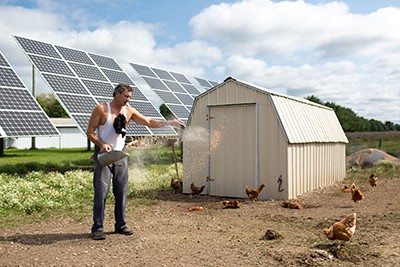
WINNER – Jeff LaBar – LaBar Poultry Farm Manistique, Michigan
Humane and sustainable farming is important to Jeff and Heidi LaBar, owners of LaBar Poultry. At the farm, it’s not unusual to see free-range hens hanging out by a 34 kWh solar array. Installing the solar array was just one of many installations and improvements the LaBars took to reduce energy waste on their farm. The couple also replaced appliances with ENERGY STAR units, upgraded their lights to LED bulbs, and installed a high-efficiency geothermal system for heating and cooling.

Kari Panse – Panse Greenhouses Kalamazoo, Michigan
By simply upgrading her lighting system to LED bulbs, Kari Panse reduced her lighting usage by 29,028 watts. Panse also added an environmental control system to her 168,000-square-foot greenhouse. The control system was developed specially for the greenhouse and manages heating, cooling, irrigation, and fertilizer dosing. Altogether, Panse saves more than 97,000 kWh of electricity and more than 3,000 MCF of natural gas per year helping this family owned business improve its maintenance and operating costs.

Refsal/Marteniuk Farms Laingsburg, Michigan
In order to attain off-grid capability for her family’s farm, Judy Refsal invested in a number of energy-efficient projects. By 2010, the entire farm had geothermal heating. Four years later, the farm received an energy audit through the Michigan Farm Energy Program. Shortly after, Refsal/Marteniuk Farms won an $18,538 USDA Rural Energy for America Program grant, which went toward a solar photovoltaic system. Annually, the farm is saving nearly $4,000 in heating and cooling and more than $2,000 in electricity costs.
CONTRACTOR OF THE YEAR
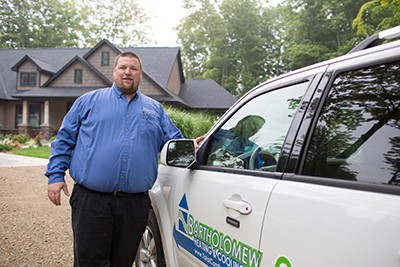
WINNER – Bartholomew Heating and Cooling/Energy Saving Services Kalamazoo, Michigan
Brad Bartholomew is a third-generation heating, ventilation, and air-conditioning contractor with his family’s company, Bartholomew Heating and Cooling / Energy Saving Services. Since 2011, the company has helped more than 1,240 customers submit applications for energy-efficiency programs sponsored by Consumers Energy. These projects have reduced residential natural gas by more than 121,000 MCF and residential electricity usage by more than 10,000 MWh. On average, Bartholomew’s customers receive 35 percent higher energy savings than the typical Consumers Energy Home Performance program participant.
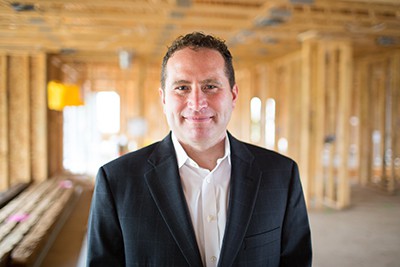
Cobblestone Homes Saginaw, Michigan
Over the past three years, Cobblestone Homes has realized energy savings of more than 54,151 kWh and 2,558 MCF. Through this dedication to energy efficiency, Cobblestone received an Excellence in Energy Efficiency award from Consumers Energy, as well as one of four home builders to win the ENERGY STAR Partner of the Year award. In Michigan, Cobblestone was the first residential builder to commit to 100 percent ENERGY STAR homes and built the first NetZero home in Michigan.
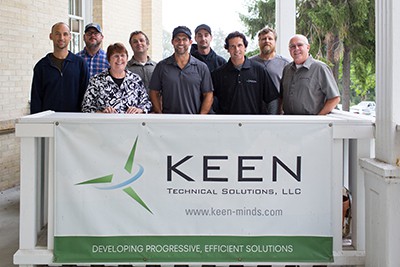
Keen Technical Solutions Traverse City, Michigan
Keen Technical Solutions’ projects have added up to 650 million kWh removed from the energy grid, 42,689 tons of carbon dioxide, 171 tons of sulfur dioxide, 62.9 tons of nitric oxide and nitrogen dioxide, and 1.77 tons of mercury removed. In addition to the energy savings, Keen has saved its clients more than $84 million. In 2013, Keen was listed in Inc. Magazine’s “500 Fastest Growing Private Companies” feature, with a reported 4,101 percent growth in three years’ time.
BEST COMMUNICATION OR EDUCATION PROGRAM
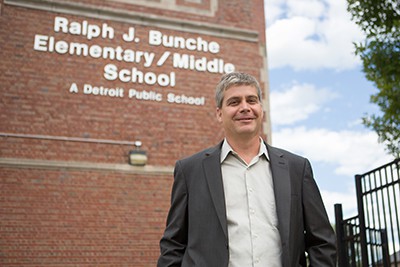
Detroit Public Schools Detroit, Michigan
In 2012, Detroit Public Schools (DPS) worked with EcoWorks to design and implement the DPS Go Green Challenge. Every year more than 3,000 students and 800 teachers and parents participate in behavior-based energy conservation projects, such as lighting audits, in-class lessons, energy patrols, and take-home materials. Since its inception, the challenge has generated $1.2 million in energy and water savings. The savings go directly back into Detroit Public Schools, with teaching and classroom resources awarded to the schools for their challenge participation.
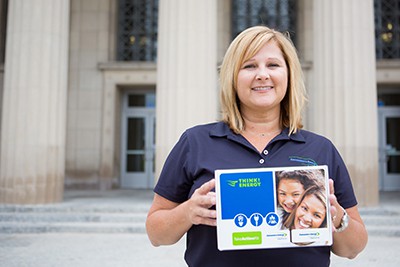
Consumers Energy THINK! ENERGY Program Jackson, Michigan
The Consumers Energy THINK! ENERGY program engages and educates Michigan elementary and middle school children on energy efficiency. The students learn through hands-on projects and a take-home energy-efficiency kit. Since 2010, the program has grown to serve more than 30,000 students in 386 schools, and has added a high school extension called Innovation. All students are taught to think, discuss, debate, and formulate ideas related to energy efficiency. This program involved many other partners to achieve success. The collaboration with the Michigan Department of Education, Lansing Board of Power and Light, and DTE Energy have resulted in 3,064 MWH in electric savings and 34,315 MCF in gas savings in 2014 alone.
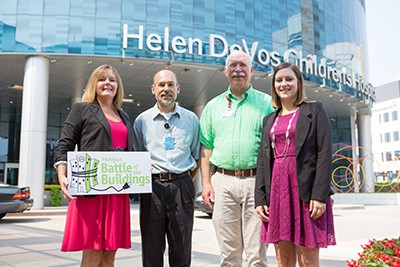
WINNER – Michigan Battle of the Buildings Greenville, Michigan
This award and recognition program encourages energy efficiency in a fun and competitive way. Program enrollment is free and open to all Michigan commercial and industrial buildings. Participants are required to use the ENERGY STAR Portfolio Manager to enter and track energy consumption data. Throughout the competition, there are education and networking opportunities. All this leads up to the big award ceremony on Earth Day, where competition winners are recognized. The 2014 initiative resulted in 14 “biggest losers” and is the only competition of its kind in the nation.
INNOVATOR OF THE YEAR
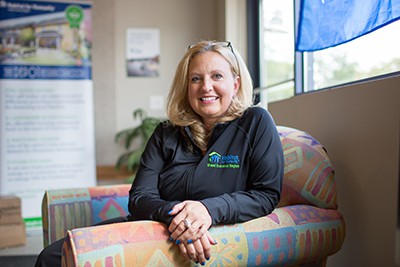
Wendy Irvin – Habitat for Humanity Grand Traverse Region Traverse City, Michigan
Habitat for Humanity builds homes for lower-income families, which puts pressure on the organization to create housing with tangible energy savings for its tenants. Wendy Irvin has been leading that charge for Habitat for Humanity Grand Traverse Region in partnership with Traverse City Light & Power to make this happen in the Depot Neighborhood, the first affordable NetZero housing community in Michigan. So far, Habitat has constructed five of these homes in this neighborhood and each house has a HERS Index Score of 1. Despite the advanced energy systems in the homes, Wendy’s efforts utilizing community partnerships and smart planning have paid off for the occupying families, as their mortgages cost only $600 to $650 per month.
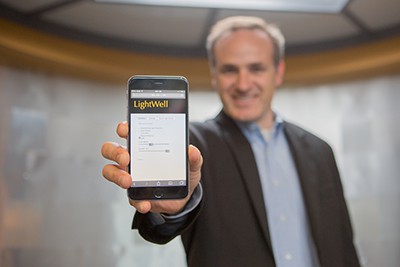
Mike Forbis – Arborlight Ann Arbor, Michigan
Mike Forbis, CEO of Arborlight, has helped lead an exciting venture that transforms the way we see LED lighting. Through his leadership, Arborlight developed LED-based products with embedded systems and feedback controls that resemble natural light inside of a skylight-like unit. The organization employs experts that develop products for the automotive industry, scientific instrumentation, and furniture manufacturers. Its products offer up to 60 percent energy savings and have the ability to replicate natural daylight as it would appear at different hours of the day. The company has been recognized nationally, and received awards from LEDs Magazine, Architectural SSL, and the Next Generation Luminaries Design Competition.
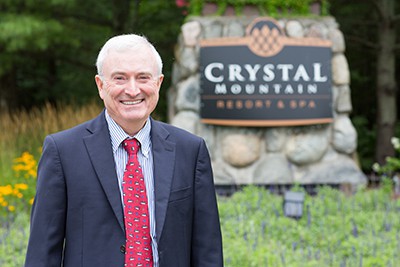
WINNER – Jim MacInnes – Crystal Mountain Thompsonville, Michigan
Led by Jim MacInnes, CEO and licensed professional engineer, Crystal Mountain has grown into a year-round destination for tourists both in and out of the state. For years, the resort has been dedicated to sustainable and efficient energy use in order to benefit its visitors and employees, as well as the environment. That dedication is demonstrated in its lighting projects, where 250 lodging units were upgraded to CFL bulbs and conference spaces received LEDs—which are expected to save the resort $500,000 over the bulbs’ lifetime. Additionally, Crystal Mountain was the first Michigan resort to purchase wind energy credits to cover the power used by its chairlifts; this reduced grid need for fossil fuel-produced energy. The resort also built the Midwest’s first LEED-certified spa with high R-value foam insulation and efficient windows and doors. Other upgrades include investments in more efficient snowmaking technology as well as demand response programming to reduce on-peak electricity loads from the snowmaking process.

